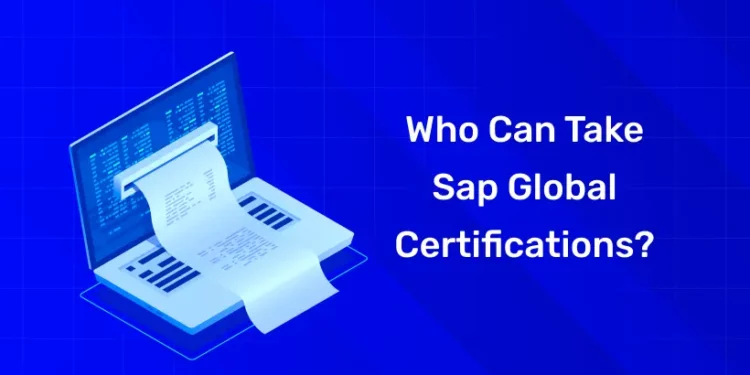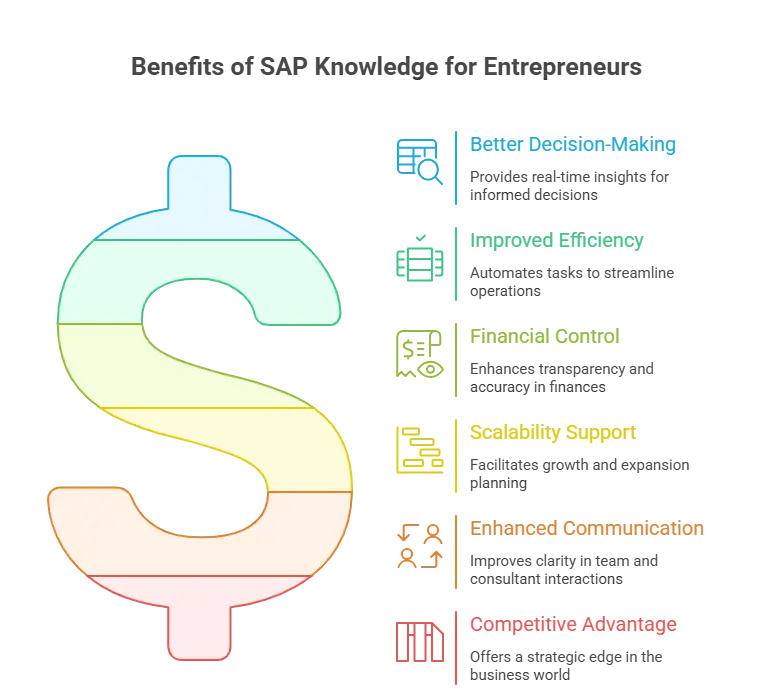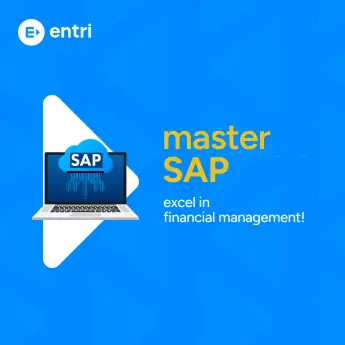Table of Contents
If you’re planning to build a career in the SAP field, you might be wondering whether SAP Global Certification is the right choice for you. The good news is that SAP certifications are designed for a wide range of learners—students, freshers, working professionals, and even experienced experts who want to upgrade their skills. Whether you come from IT, finance, HR, supply chain, or any other background, SAP offers different modules to match your career goals and help you grow in today’s fast-changing job market.
Join Entri’s SAP FICO Training Course today!!
Introduction to SAP Global Certifications
SAP Global Certifications are internationally recognized credentials that prove your skills and knowledge in different SAP modules. These certifications are trusted by top companies around the world because they show that you understand how to work with SAP systems in real business environments. Whether you are a student, fresher, or an experienced professional, SAP certification helps you build credibility, improve your job opportunities, and stay updated with the latest SAP technologies like S/4HANA and cloud-based solutions. It is one of the best ways to start or grow your career in the SAP ecosystem.
Eligibility Requirements for SAP Certification
SAP Certification is one of the most trusted qualifications for anyone who wants to build a career in business operations, finance, HR, supply chain, IT, and enterprise software. The good news is that SAP has flexible eligibility requirements, so learners from different educational and professional backgrounds can apply. Below is a clear and friendly explanation of who can take SAP Certification and what you need before starting your journey.
1. Basic Educational Qualification
To appear for most SAP certifications, you should have at least a Bachelor’s degree from a recognized university.
This degree can be in Commerce, Arts, Science, Engineering, Management, or Computer Science.
While certain modules relate better to specific backgrounds, SAP does not restrict anyone from learning.
For example:
- Finance/Commerce graduates often choose SAP FICO
- Engineering graduates go for SAP MM, PP, or SD
- HR graduates prefer SAP HCM
- IT students take SAP ABAP, Basis, or HANA
However, SAP welcomes learners from all streams as long as they are willing to learn the concepts.
2. Computer and Technical Skills
- You do not need advanced technical knowledge.
- Basic computer skills such as operating a system, browsing the internet, and understanding simple software functions are enough.
- Functional modules do not require programming, while technical modules may need coding knowledge.
3. Work Experience (Helpful but Not Mandatory)
- Many people assume SAP certification requires job experience. This is not true.
- Freshers can also apply and successfully complete SAP certifications.
- However, having 1–3 years of experience in fields like finance, HR, sales, or logistics can make the learning process easier and help in practical understanding.
4. Domain Knowledge
Basic knowledge in the area you want to specialize in is an advantage.
For example:
- Knowledge of accounting helps in FICO
- Understanding of sales cycles benefits SD learners
- HR concepts are useful for HCM
This is not compulsory, but it helps in grasping concepts faster.
5. Training Requirements
- Some SAP exams require candidates to undergo official SAP training through authorized learning centers or the SAP Learning Hub.
- This ensures learners gain proper hands-on experience before taking the certification exam.
6. Language Skills
- SAP training materials and exams are usually in English.
- So, having basic English reading and understanding skills is important.
- Fluency is not required—simple comprehension is enough.
Master SAP with Expert-Led Courses
Unlock your potential with our comprehensive SAP courses! Learn essential modules like SAP MM (Materials Management), SAP SD (Sales and Distribution), and SAP FICO (Financial Accounting and Controlling) from industry experts.
Know MoreStudents and Fresh Graduates Who Can Apply
SAP Certification is a great choice for students and fresh graduates who are looking to start a strong and rewarding career in the IT or business domain. The process is simple, and the eligibility requirements are flexible, making SAP accessible to learners from different academic backgrounds.
Open to Students from Any Stream
One of the biggest advantages of SAP Certification is that it welcomes students from all educational streams. Whether you are studying Commerce, Science, Engineering, Arts, Computer Science, or Management, there is an SAP module that fits your interest.
- Commerce students → SAP FICO
- Engineering students → SAP MM, SD, PP
- Computer science students → SAP ABAP, Basis, HANA
- HR/Management students → SAP HCM
Even if your degree is not directly related to SAP, you can still learn it with proper training.
No Work Experience Required
Fresh graduates often worry about not having job experience, but SAP does not require any prior work experience for most modules.
What matters is your interest in learning business processes, basic computer skills, and the ability to practice regularly.
Training institutes provide hands-on sessions, practical exercises, and real industry scenarios to help beginners understand concepts easily.
Final-Year Students Can Also Start
If you are in your final year of college, you can begin SAP training in advance. This gives you a strong advantage during campus placements and early career job searches. By the time you graduate, you will already have valuable skills that employers are looking for.
Entry-Level Job Opportunities After Certification
After completing SAP certification, freshers can apply for several beginner-friendly roles such as:
- SAP Trainee
- SAP Support Engineer
- Junior SAP Functional Consultant
- SAP Analyst
These roles are available across industries like IT, manufacturing, retail, banking, logistics, and more.
A Smart Career Move for Beginners
In simple words, SAP is an excellent career path for students and fresh graduates who want to start early and grow fast. With the right training and dedication, you can begin your SAP journey confidently and build a successful future in the global job market.
Working Professionals Looking to Upskill
SAP Certification is an excellent opportunity for working professionals who want to advance their careers, switch to high-demand roles, or stay competitive in today’s fast-changing job market. Many professionals choose SAP as their next career step because SAP skills are valuable across almost every industry, including IT, manufacturing, retail, banking, logistics, healthcare, and consulting. Whether you are currently in a technical role or a non-technical position, SAP offers modules that match your career goals.
Suitable for Professionals from Any Background
One of the biggest advantages of SAP learning is that it is open to professionals from all work backgrounds.
Even if you are working in finance, HR, sales, supply chain, operations, administration, or customer support, there is a suitable SAP module for you.
For example:
- Finance professionals can upskill with SAP FICO
- HR professionals can learn SAP HCM or SuccessFactors
- Supply chain professionals can move to SAP MM, SD, or PP
- IT professionals can choose SAP ABAP, Basis, or HANA
- Sales or marketing professionals may prefer SAP SD or CRM
This flexibility makes SAP a powerful career upgrade tool for those who want to grow in their existing field or explore new opportunities.
Upskilling for Career Growth and Better Salaries
Many professionals pursue SAP certification to achieve better career growth.
SAP-certified employees often receive:
- Higher salary packages
- Faster promotions
- Opportunities to work on global projects
- Better job stability
- Chances to switch to MNCs or international roles
SAP expertise is highly valued because companies need skilled professionals to manage their ERP systems efficiently.
Ideal for Career Switchers
If you are planning to switch from a non-technical to a technical role, or vice versa, SAP provides a smooth transition. Functional modules do not require programming knowledge, making it easier for non-IT professionals to shift into SAP consulting roles. Similarly, IT professionals can shift to strong technical modules like ABAP or HANA to build long-term technical careers.
Upskilling Without Leaving Your Job
The best part is that working professionals can learn SAP without leaving their current job.
Most institutes offer flexible learning options such as:
- Weekend batches
- Online live classes
- Self-paced courses
- Evening classes
This allows professionals to upskill at their own pace.
A Smart Investment for Your Future
For any working professional, SAP Certification is a smart investment that opens doors to global job opportunities, better pay, and long-term career growth. With the right training and commitment, you can upgrade your skills and move confidently toward a more rewarding career path.
IT Professionals Transitioning to SAP
For many IT professionals, transitioning to SAP is one of the smartest career moves in today’s technology-driven world. SAP is a globally recognized enterprise software that powers thousands of large companies across industries. Because of its wide usage and high impact on business operations, organizations are always in need of skilled SAP experts. This makes SAP a highly rewarding career path for those already working in the IT field.
A Natural Transition for IT Backgrounds
IT professionals already have an advantage when entering the SAP domain. Their technical knowledge, understanding of software systems, and experience working with databases, programming, or system operations make it easier to grasp SAP concepts.
Professionals with backgrounds in:
- Software development
- Database management
- Networking
- System administration
- Cloud technologies
- IT support or operations
can smoothly transition to SAP technical modules like SAP ABAP, SAP Basis, SAP HANA, SAP Security, and SAP Fiori/UI5.
Wide Choice of Modules for IT Roles
SAP offers several technical modules that perfectly match the skill sets of IT professionals:
- SAP ABAP – Ideal for those with programming experience (Java, C, C++, Python, etc.)
- SAP Basis – Suitable for system administrators or network engineers
- SAP HANA – Perfect for professionals with database or SQL knowledge
- SAP Fiori/UI5 – Great for front-end or UI developers
- SAP Security/GRC – Suitable for cybersecurity and compliance professionals
These modules allow IT professionals to use their existing skills while learning advanced enterprise-level technologies.
Better Career Growth and High Demand
Transitioning to SAP can significantly boost career growth.
IT professionals who move into SAP often enjoy:
- Higher salary packages
- More stable and long-term career opportunities
- Chances to work on international projects
- Faster promotions
- Opportunities to collaborate with global teams
Since SAP systems are critical for business operations, skilled professionals remain in high demand.
Smooth Learning Curve for IT Professionals
Learning SAP becomes easier for IT professionals because they already understand concepts like data structures, logic building, troubleshooting, and system integrations.
Even functional concepts can be learned with good training and practice.
Many training programs offer hands-on labs, real-world scenarios, and project-based learning, helping IT professionals build confidence quickly.
Master SAP with Expert-Led Courses
Unlock your potential with our comprehensive SAP courses! Learn essential modules like SAP MM (Materials Management), SAP SD (Sales and Distribution), and SAP FICO (Financial Accounting and Controlling) from industry experts.
Know MoreFinance, HR, and Supply Chain Professionals Eligible for SAP Modules
SAP is one of the most powerful business management systems used by companies across the world. Because of this, professionals working in Finance, Human Resources (HR), and Supply Chain fields are highly suitable for SAP careers. Their existing domain knowledge makes it easier to understand SAP processes and apply them in real business situations. SAP offers specialized modules for each of these fields, giving professionals a chance to upgrade their skills and move into high-demand roles.
1. Finance Professionals
Finance professionals—such as accountants, auditors, financial analysts, or those working in banking—are perfect candidates for SAP Finance modules.
The most popular module for them is SAP FICO (Financial Accounting and Controlling).
With their background in accounting, budgeting, taxation, or financial reporting, finance professionals can easily understand FICO concepts like:
- General ledger
- Accounts payable and receivable
- Asset accounting
- Cost controlling
- Financial reporting
SAP FICO is one of the most in-demand modules, and certified professionals are often hired by top MNCs and global consulting firms.
2. Human Resource (HR) Professionals
HR professionals with experience in recruitment, payroll, employee management, or training can build strong careers in SAP HR modules.
The main options for HR professionals are:
- SAP HCM (Human Capital Management)
- SAP SuccessFactors (cloud-based HR solution)
Their knowledge of employee lifecycle, payroll processes, performance management, and HR policies helps them understand SAP functionalities quickly.
SAP HR consultants are needed in almost every organization because people management is a core business function.
3. Supply Chain Professionals
Professionals working in supply chain, logistics, warehouse management, procurement, or sales operations are highly suitable for SAP’s supply chain modules.
Some popular modules include:
- SAP MM (Materials Management)
- SAP SD (Sales and Distribution)
- SAP PP (Production Planning)
- SAP WM/EWM (Warehouse Management / Extended Warehouse Management)
Their daily tasks—such as purchasing materials, managing stock, tracking orders, coordinating with vendors, and planning production—match directly with SAP processes.
This makes learning SAP easier and more meaningful for supply chain professionals.
Entrepreneurs and Business Owners Benefiting from SAP Knowledge
In today’s competitive business world, entrepreneurs and business owners are always looking for ways to improve efficiency, reduce costs, and make smarter decisions. SAP, being one of the world’s most trusted enterprise software systems, helps businesses of all sizes manage their operations more effectively. While SAP is commonly associated with large corporations, even small and medium business owners can benefit greatly from understanding how it works. Learning SAP is not just for employees—it can be a powerful advantage for entrepreneurs too.
Helps in Better Business Decision-Making
Entrepreneurs often need to make quick and accurate decisions. SAP provides real-time insights into finance, sales, inventory, human resources, customer data, and more.
When business owners understand SAP concepts:
- They can analyze reports more effectively
- Identify financial risks sooner
- Track sales and revenue patterns
- Monitor business performance without relying completely on others
This helps them make data-driven decisions that support growth and stability.
Improves Efficiency and Reduces Operational Costs
SAP helps automate many daily business tasks such as invoicing, purchasing, stock management, payroll processing, and customer handling.
When business owners know how SAP works, they can:
- Simplify processes
- Reduce manual errors
- Speed up workflows
- Cut unnecessary costs
- Manage resources more efficiently
This leads to smoother operations and better productivity.
Stronger Control Over Financial Activities
Finance is the heart of any business. Entrepreneurs with SAP knowledge can easily understand financial reports, track expenses, predict cash flow, and ensure compliance.
SAP FICO, for example, helps business owners maintain transparency and accuracy in financial records. This is especially helpful for startups and growing businesses that need solid financial discipline.
Supports Business Expansion and Scaling
As a business grows, managing operations becomes more challenging. SAP supports scalability, meaning it can grow along with the company.
Business owners who understand SAP can plan expansions more intelligently because they know how the system supports:
- Multi-location operations
- Inventory expansion
- Advanced sales planning
- Workforce growth
This makes scaling smoother and less risky.
Better Communication with Teams and Consultants
Entrepreneurs often work with consultants, managers, and technical teams. Knowing SAP allows them to communicate more clearly, understand project requirements, and take part in important discussions.
This avoids misunderstandings and speeds up business improvements.
A Competitive Advantage for Modern Business Owners
In simple words, SAP knowledge gives entrepreneurs a clear advantage. It helps them run their business smarter, reduce costs, increase efficiency, and make informed decisions. Whether you run a startup, a small business, or a growing company, learning SAP can add tremendous value to your business journey.
Career Changers Entering the SAP Domain
Switching careers can be challenging, but SAP provides a smooth and promising path for people who want to change their professional direction. Many individuals from non-IT, administrative, finance, HR, logistics, or customer service backgrounds successfully move into SAP because it offers high demand, excellent salaries, and long-term career growth. SAP is flexible and beginner-friendly, which makes it a great option for those who want to start fresh with a future-ready skill.
A Welcoming Field for Non-IT and IT Professionals
The SAP domain is not restricted to people with coding or technical knowledge.
If you come from a non-technical background such as finance, HR, sales, procurement, or operations, you can choose functional modules like:
- SAP FICO
- SAP HCM
- SAP MM
- SAP SD
- SAP PP
- SAP CRM
These modules focus on business processes and do not require programming skills.
If you come from a technical background, you can choose modules like:
- SAP ABAP
- SAP Basis
- SAP HANA
- SAP Security
- SAP Fiori/UI5
Whether you are from IT or non-IT, SAP has a place for you.
Why SAP is Ideal for Career Switchers
People switch to SAP for many reasons:
- It offers better job stability and long-term opportunities
- SAP consultants are highly paid compared to many other fields
- Job roles are available across industries like IT, retail, banking, manufacturing, and logistics
- SAP skills are recognized globally, opening doors to international jobs
- Work-life balance is often better in SAP roles
For many career changers, SAP becomes a life-changing decision that brings growth and satisfaction.
Easier Learning Curve with Proper Training
Even if SAP is new to you, the learning curve is manageable with the right training and consistent practice.
Training institutes provide:
- Step-by-step lessons
- Hands-on practice
- Real business scenarios
- Mentor guidance
- Project-based assignments
This makes it easier for career changers to understand concepts and build confidence.
Opportunities Available After Switching to SAP
Once you complete SAP training or certification, you can apply for roles such as:
- SAP Functional Consultant (Junior Level)
- SAP Analyst
- SAP Support Consultant
- SAP End User → SAP Consultant (with experience)
These roles offer strong growth opportunities and pathways to senior consultant or managerial positions over time.
Prerequisites for Different SAP Modules
SAP offers a wide range of modules, and each one supports a specific business function. The good news is that SAP does not have strict prerequisites. However, having basic knowledge related to the module you choose can make learning easier and more meaningful. Below is a simple and helpful guide to the prerequisites for popular SAP modules.
1. SAP FICO (Finance & Controlling)
Who can learn: Commerce graduates, accountants, finance professionals, MBA Finance students
Helpful prerequisites:
- Basic understanding of accounting principles
- Knowledge of financial statements (Balance Sheet, P&L)
- Familiarity with taxation or budgeting concepts
You don’t need advanced financial experience—simple accounting knowledge is enough to start.
2. SAP MM (Materials Management)
Who can learn: Supply chain professionals, logistics graduates, engineering students
Helpful prerequisites:
- Basic knowledge of procurement
- Understanding of inventory or warehouse operations
- Interest in supply chain concepts
No technical background is required.
3. SAP SD (Sales & Distribution)
Who can learn: Sales executives, marketing students, business development professionals
Helpful prerequisites:
- Understanding of sales cycles
- Basic knowledge of order processing
- Familiarity with customer service tasks
People-friendly and easy for business-minded learners.
4. SAP PP (Production Planning)
Who can learn: Mechanical/production engineers, manufacturing professionals
Helpful prerequisites:
- Basic knowledge of manufacturing processes
- Understanding of production workflows
- Interest in factory or production operations
Ideal for those with engineering or industrial experience.
5. SAP HCM / SuccessFactors (Human Resources)
Who can learn: HR graduates, recruiters, HR managers
Helpful prerequisites:
- Basic HR concepts (recruitment, payroll, employee data)
- Interest in people management
- Understanding of employee lifecycle
SuccessFactors is cloud-based and perfect for modern HR roles.
6. SAP ABAP (Technical Programming)
Who can learn: IT students, programmers, software developers
Helpful prerequisites:
- Programming basics (C, C++, Java, or Python)
- Logical thinking and coding interest
- Basic database knowledge
Ideal for those who want a technical SAP career.
7. SAP Basis / Security
Who can learn: System administrators, IT support, network engineers
Helpful prerequisites:
- Basic knowledge of servers and networking
- Understanding of operating systems
- Interest in system monitoring and security
Perfect for IT infrastructure professionals.
8. SAP HANA (Database & Analytics)
Who can learn: Data analysts, IT professionals, developers
Helpful prerequisites:
- SQL knowledge
- Understanding of databases
- Interest in analytics and large data processing
HANA is one of the most in-demand SAP skills today.
Join Entri’s SAP FICO Training Course today!!
Conclusion: Who Should Consider SAP Certification
SAP Certification is a powerful choice for anyone looking to grow their career in today’s digital world. Whether you are a student starting your professional journey, an IT professional aiming to upgrade your skills, a business owner who wants to streamline operations, or someone planning a career change, SAP offers opportunities for everyone. It helps you build strong technical knowledge, improves problem-solving skills, and increases your chances of getting placed in top companies. If you want a stable, high-paying, and future-ready career, SAP certification is definitely worth considering. It opens doors to global job roles, better salary packages, and long-term growth in almost every industry.
| Related Links | |
| Which SAP Module Is Best for Freshers | Top Companies Using SAP Software in India |
| Which SAP Module is Best for Logistics | Top SAP Interview Questions and Answers |
Master SAP with Expert-Led Courses
Unlock your potential with our comprehensive SAP courses! Learn essential modules like SAP MM (Materials Management), SAP SD (Sales and Distribution), and SAP FICO (Financial Accounting and Controlling) from industry experts.
Know MoreFrequently Asked Questions
Can beginners or fresh graduates take SAP Global Certifications?
Yes. Fresh graduates from any educational background—such as B.Com, BBA, B.Sc, B.Tech, or MBA—can take SAP Global Certifications. You don’t need prior work experience for many modules. Beginners who want to start a career in IT, finance, HR, or supply chain can choose foundation-level SAP modules and grow from there.
Is SAP certification suitable for working professionals?
Absolutely. SAP is highly recommended for professionals already working in IT, finance, accounting, HR, logistics, marketing, or sales. Many people pursue SAP certification to upgrade their skills, switch to better job roles, or move into high-paying SAP consultant positions. Both technical and functional professionals can benefit.
Can non-technical professionals take SAP certifications?
Yes. Many SAP modules do not require programming knowledge. Functional modules like SAP FICO, HCM, MM, SD, and SuccessFactors are ideal for commerce, management, HR, and operations professionals. Non-tech candidates can succeed easily by learning business processes and system usage.
Do I need a specific educational qualification to take SAP certification?
There is no strict educational requirement. However, having a relevant background helps. For example:
-
Commerce graduates: SAP FICO
-
HR graduates: SAP HCM / SuccessFactors
-
Engineering graduates: SAP MM, SD, PP, ABAP
-
IT graduates: SAP Basis, ABAP, BTP
SAP is flexible and accepts learners from various streams.
Can career changers or people with gaps in employment take SAP certification?
Yes, SAP certification is an excellent option for career changers. Even if you are shifting from a non-IT background or have taken a career break, SAP provides structured learning and strong placement potential. Many people restart their careers successfully through SAP modules that match their strengths.
Are entrepreneurs and business owners eligible for SAP certification?
Definitely. Business owners who want to digitalize their operations, automate processes, or understand ERP systems can greatly benefit from SAP knowledge. It helps them improve decision-making, reduce costs, and manage business functions more efficiently.
Can students pursue SAP certification along with their college studies?
Yes. Many students start SAP training while completing their degree. Starting early helps them build strong technical skills and increases job opportunities after graduation. However, students should choose a module that aligns with their future career goals.
Are there age restrictions for SAP Global Certifications?
No. There is no age limit for SAP certification. Whether you are 18 or 50+, you can learn SAP at any stage of your career. What matters most is your interest, dedication, and willingness to learn.












